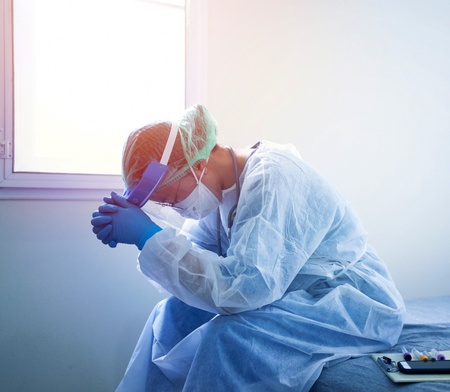A nationwide team of scientists, including researchers from the University of Aberdeen are to investigate the effect of the pandemic on stress in NHS intensive care nurses.
The group were awarded a grant of more than £184,000 from the National Institute for Health Research as part of a £5.5m investment that will fund nine new research projects into the long-term impact of Covid-19.
In the CANDID (Critical care and re-Deployed Nurses: the impact of COVID-19 on work related stress) study, the team of researchers and clinicians from across Scotland will investigate how the pressures brought about by the pandemic have affected stress and wellbeing in nurses working in critical care across the UK. Researchers will also look at the support services offered to nurses during the pandemic to explore how successful these interventions have been.
Over the next few months, nurses working across Scotland and in three English critical care units will be asked to complete a questionnaire and take part in an in-depth interview to try to gain an understanding of how the pandemic has affected them at work. The responses will then be compared to a similar study completed just before the onset of Covid-19.
Professor Dixon from the University of Aberdeen who will co-lead the study explains: “Covid-19 has placed great pressure on nurses who have been working within extremely challenging circumstances. This includes delivering care whilst wearing cumbersome PPE, increased patient mortality rates, communicating and supporting relatives at a distance, all in addition to dealing with the potential risks to their own and their family’s health.
“It is important to understand how nurses working in critical care have experienced and been affected by the pandemic as it’s possible that the physical and psychological wellbeing of nurses working critical care during the pandemic has been affected and in turn, their intention to continue in critical care nursing reduced. .
“We hope that these results could help further our understanding of how the impact of stress can be mitigated by personal, job and support resources, so that the NHS can be better prepared to support and retain critical care staff.”
Dr Janice Rattray, Honorary Reader in Acute and Critical Care Nursing from the University of Dundee who also co-leads the study added: “Supporting the well-being of nurses working in critical care is crucial, and to do this effectively we need to understand fully the impact of the pandemic on critical care (CCNs) and redeployed nurses.
“By identifying specific stressors, their importance and how these influence outcome in CCNs and redeployed nurses and their NHS organisations will allow us to do this. Without this knowledge, we cannot identify confidently an appropriate range of supportive measures to protect this vital workforce, or indeed for whom, when and how to implement them.”
The Scottish Government’s Chief Nursing Officer, Professor Amanda Croft said: “This study is welcomed, it is important that we look at the impact the pandemic has had. In Scotland we are committed to improving the wellbeing of health and social care staff across Scotland and have taken immediate action to provide support while they continue respond to the pandemic. We are also working to build a sustainable culture that will continue to prioritise staff wellbeing in the future.
“We have introduced a National Wellbeing Hub to provide a range of self-care and wellbeing resources, alongside a National Wellbeing Helpline to provide a 24/7 service for those who need further psychological support. We also recently launched the Workforce Specialist Service to offer confidential mental health treatment, provided £500,000 for the provision of practical support and made available additional funding to increase capacity and capability to provide psychological services. We are pleased to see this type of research being conducted.”
ENDS


